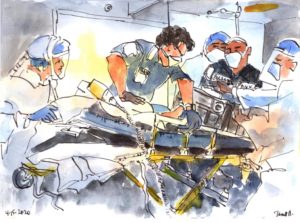Tracy Granzyk has a background in filmmaking and now works at the nexus of healthcare and storytelling as the Founder and Director of the Center for Healthcare Narrative at the MedStar Institute for Quality and Safety. We awarded the Institute a grant this Spring to fund Please See Me, a healthcare-themed literary journal: Granzyk serves as Please See Me’s Editor-in-Chief. Works in the journal come from patients, healthcare workers, caregivers, and more. She wrote here about the power of stories in healthcare.

In 2007 I was asked by anesthesiologist David Mayer, MD, to help create an educational documentary film covering the medical error that took the life of patient advocate Helen Haskell’s fifteen-year-old son, Lewis Blackman. The film would later serve as the foundational story-based curriculum for the Academy of Emerging Leaders in Patient Safety, which provides an immersive 4-day course in patient safety for medical and nursing students and resident physicians.
Dave knew stories had a better chance to connect the heart and the head of medical professionals and students than PowerPoint slides or data ever would, so he enlisted me as a writer and SolidLine Media, a film crew, to craft a narrative that would help change medical culture to be more open and honest when things go wrong.
Meeting Helen, getting to know her son Lewis through the stories she shared, and working with now global patient safety leader David Mayer changed not only my career, but also my life’s work. For as long as I can remember, I wanted to be a writer. I had a brilliant grade school teacher, Robin Fogarty, who turned Language Arts into a playground for young minds that gravitated toward stories. Each writing exercise she assigned was more creative than the last. Through her, I learned about concrete poems, journaling, and composition. I read constantly and fell in love with Meg and Charles Wallace, Madeleine L’Engle’s fictional children in A Wrinkle in Time. My reading world expanded, and I later found Thoreau, Didion, Oates, Harper Lee, Tim O’Brien, Alex Kotlowitz, Toni Morrison, and James Baldwin. I met people and fell in love with characters both like and unlike me through books. I took solace in knowing these writers and characters worried about similar things. I was galvanized for causes I was passionate about, like social justice, that these writers championed through characters or memoir.

Flash forward to today. Over twenty years of working in various roles within healthcare has taught me there are many passionate, caring people treating patients and developing related drugs, devices, and technology. It has also taught me that we still have a long way to go to serve every person equally and well. Some would say we have two health systems; one for white people and one for people of color. COVID-19 has only highlighted those disparities. My love of story, my need for getting to the heart of the matter, and my need for justice in the world has been my true north throughout every career turn.
Now, as founding executive director of the Center for Healthcare Narratives at the MedStar Institute for Quality & Safety, I have found a home from which to create, curate, and coach health-related stories that matter to everyone. Please See Me, the online literary magazine for health-related stories I created to elevate the voices and stories of vulnerable populations and those who care for them, is a humanities-based project that I hope will equalize the healthcare playing field. We have to make room for every story—not just the ones we know or understand or have lived. We have to get more comfortable with what isn’t familiar, and embrace and welcome every person along with his, her, or their story. Stories engender much-needed empathy, which leads to understanding that will make the world a better place. We need stories now more than ever.
In gratitude to the Maryland Humanities team who believes in our publication, and our mission.
Disclaimer: The views and opinions expressed on our blog do not necessarily reflect the views or position of Maryland Humanities or our funders.

